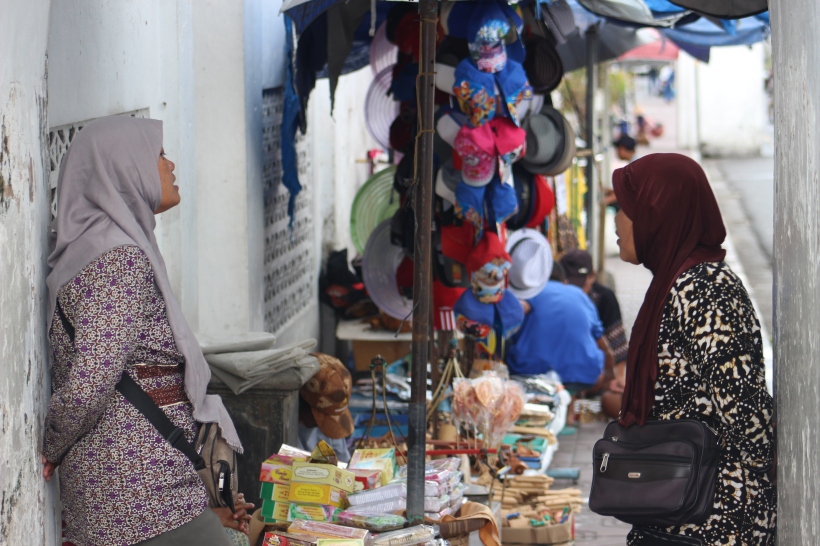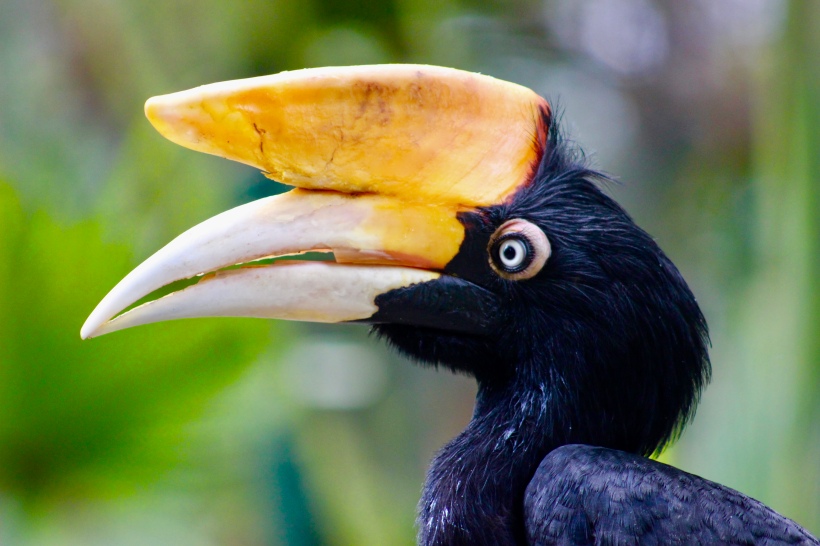A country known for its tropical weather, tourism, clear blue ocean waters, beautiful wildlife, and delicious food is often overlooked on its corruption, traffic chaos, poor health and hygiene conditions and national distribution to global warming. From time to time it is forgotten by many that this country is the fifth biggest in the world yet one of the most underdeveloped nations on the planet. Therefore, 12 days in the cultural city Yogyakarta, located south east of Jakarta on the island of Java, gave me a thorough understanding of the local people and culture. I say local because Indonesia is so culturally diverse that experiences in one city cannot be generalized for the entire country.
Compared to Seoul, one of the most innovative and advanced cities in the world, Yogyakarta is completely on the other side of the spectrum. The differences are unimaginable and the contrasts even more so.
Overwhelmed by the traffic and the thick layer of pollution coming from exhausts of all kinds of vehicles, I observed the people and the culture from the back of my girlfriend’s scooter for 12 days. A true culture shock from the moment I touched ground in Jakarta, where I had to switch terminals for my final flight to Yogyakarta. I was seen and treated like a member of the royal family, with great respect, many going out of their way to help me get to the right terminal, pulling my suitcase, always smiling and saying “hello”. Countless amounts of people approached me for selfies or a picture. At first it was a fun experience, I took a few with my phone too, but suddenly it became overwhelming. One after the other they approached me at the gate for a selfie. Waiting for my last flight to depart after several announcements of it being delayed and having to randomly switch gates, a local approached me for a selfie. One became two, which became three, and then resulted in him video calling some of his friends showing me to them. As if they hadn’t believed I was real. A funny experience at first, but soon annoying as he kept shaking my hand, touching my hair and laughing. Regardless, there was not a moment where I felt uncomfortable or awkward during my 12 days, just a few encounters were very new to me and rather interesting to experience.

Indonesia has made me realize how there are a lot of things in our daily life that we take for granted, such as food, clean drinking water, electricity, a warm shower, and incredible education. While visiting the Tamansari, the Sultan’s old summer palace, our (free) guide proudly showed us a picture of, what he called, his best friend, Mark Zuckerberg. In 2008, the founder of Facebook installed internet connections within the walls of the Tamansari in a village now recognized as the Cyber Village. This way, people can now connect. Something that really surprises me is how people are obsessed with social media, even more than in Seoul which happens to be one of the most connected cities in the world. Though many have close to nothing in Yogyakarta, I saw some of the latest and biggest smartphones in the hands of some of the poorest people in the country. A true contrast illustrating how even underdeveloped countries try to connect with the rest of the world. Comparing it to European cities, or even Seoul, Yogyakarta is a world on its own. People seem to have no sense of safety, traffic rules, sustainability (not that they do in Seoul either), personal hygiene, nor an understanding on the importance of the future. They live day by day, a manager and chef of a Spanish restaurant in Yogyakarta told my girlfriend and I, when we were out for dinner, that if you give them 1 million rupiahs (63 euros) they’ll spend it within a day. But give them 20,000 Rupiahs (1.30 euros) a day, and they’ll manage to survive for a while. A perception on the future is definitely something most locals lack in my opinion.

When it comes to sustainability, the amounts of pollution are unimaginably bad, and the people don’t seem to have a sustainable approach to life either. Makes complete sense if they don’t think nor care about the future, as climate change is not something you can change in a day. Also, they have much more urgent matters to worry about, such as survival. I have seen people set fire to a heap of plastic and drive any means of transport as long as it moves. Regulations don’t exist, and a thick cloud of dark black exhausts just sits above the city. Busses that would otherwise be forbidden from driving in Europe are standard here. The fact that it looks like it is about to break down does not mean it can’t drive, therefore it is regarded as a legitimate mean of transport. Regarding traffic, there isn’t a word that can describe the somewhat organised chaos. People buzzing on their scooters in all directions, overtaking when there is very little space for it and honking for almost everything. People drive carelessly, with little respect for other drivers, and it almost seemed like I was constantly stuck in a scooter race on the ring road of Yogyakarta. The only universal rule that applies is to not crash with the person in front of you. Funnily enough, people rely on this and barely ever look over there shoulder when driving. Who is the first to leave when the traffic light turns green? Who is can overtake the most cars? Who is the biggest daredevil? Yet, surprisingly, not a single accident occurred in those 12 days. Somehow they seem to still stay somewhat in control.

Hospitality in Indonesia, on the other hand, is incredible. Everyone, no matter what age, how little English they speak, or how few teeth they have, will smile. I believe it has to do with the fact that every white foreigner seems to amaze them so much, that they are instantly fascinated. However, I’ve been told and have also experience locals being like this to one and other. With having so little, family, friends and the community means everything to them. It’s their source of happiness and often their key to survival. Tour guides are for free and people in restaurants, locals at fruit stalls, and cashiers at cash desks of tourist attractions will always ask where I’m from. Few will often respond with “ik spreek ook een beetje Nederlands” (I also speak a bit of Dutch), when I tell them I’m from the Netherlands. This is because the Dutch East Indies used to be a Dutch colony consisting of what is now known as the Republic of Indonesia. The colony was formed from the nationalized colonies of the Dutch East India Company, which, in 1800, came under the administration of the Dutch government. The level of Dutch in Indonesia is slowly but gradually fading and less and less people speak just a few more words. Anyway, a nice bit of home away from home, almost 12,000 km apart.

The locals are very welcoming, open, caring and interested. They can sometimes get pushy in touristic areas where they constantly tried to draw us into their restaurants or shops, but otherwise very relaxed and laid-back. One afternoon we went for a Batik workshop. Batik is the traditional technique. Batik is a technique of wax-resist dyeing applied to cloth. Batik is either made by drawing dots and lines with a spouted tool called a canting. It is used very often in Indonesia to design all sorts of clothing, ranging from shirts to pants to summer scarves. We were received with great hospitality by a few older women and a younger man who spoke very good English for Indonesian standards, and we truly felt at home. After the workshop of after a good hour, they decided to take us for lunch with their kids and drove us through countless amounts of rice fields, through steep roads and worn-out villages to a small alley of local restaurants. They ordered for us, paid for us, and really enjoyed learning about our cultures as we were curious to find more about their daily lives. It was only during lunch when I saw that the two kids of 5 and 8 who had a few teeth left in their mouth, that we take even the basic hygiene products such as a toothbrush for granted. That was a moment of true culture shock for me, far beyond my comfort zone and a moment of realization how good our lives are, how lucky we should consider ourselves and how we should make the most out of every day and opportunity we have. Because if they can do it here in Indonesia with very little to make them happy, why can’t we in Europe where we’re unbelievably spoiled? It was then when I realised what is really important in life, and that we need to stop worrying about our Instagram likes, Facebook friends, or how other perceive us.
Lastly, observing Indonesians in the streets has taught me how collectivist they are, and how to value everyone that stands close to you and shows support. In our western culture we are too focussed on ourselves, only want to achieve the greatest successes on our own. We live in an incredibly competitive environment. In Yogyajakarta, however, people strive together in everything they do. They care about their families in a way that I’ve never seen anywhere else before. It’s touching and inspirational to say the least. My 12 days there have shown me the other side of the world, what its like to live in harsh conditions, how to value everything we have and not take anything for granted and mainly, how to make the most of your life every single day.
An interesting city, with beautiful people, delicious food and a fascinating collectivist culture. Not leaving it here, will definitely come back to explore more of the country!




